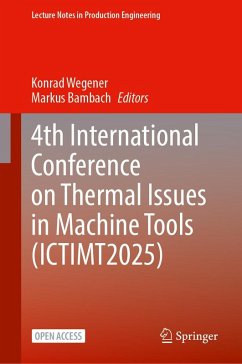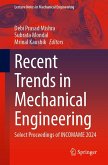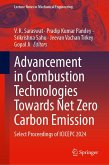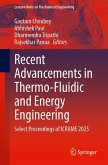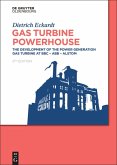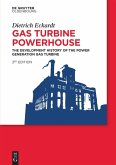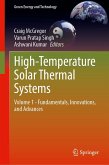4th International Conference on Thermal Issues in Machine Tools (ICTIMT2025)
Herausgegeben:Wegener, Konrad; Bambach, Markus
4th International Conference on Thermal Issues in Machine Tools (ICTIMT2025)
Herausgegeben:Wegener, Konrad; Bambach, Markus
- Gebundenes Buch
- Merkliste
- Auf die Merkliste
- Bewerten Bewerten
- Teilen
- Produkt teilen
- Produkterinnerung
- Produkterinnerung
This open access conference proceedings contains all the papers presented at ICTIMT 2024, the 4th International Conference on Thermal Issues in Machine Tools.
The precision of machine tools is primarily affected by their thermal behavior. Over the past two decades, it has become clear that simply placing machines in a temperature-controlled environment is not the most efficient solution. Instead, machine tool manufacturers are responsible for minimizing the misbehavior of their machines under normal job shop conditions. This requires a profound understanding of the energy conversion within…mehr
Andere Kunden interessierten sich auch für
![Recent Trends in Mechanical Engineering Recent Trends in Mechanical Engineering]() Recent Trends in Mechanical Engineering151,99 €
Recent Trends in Mechanical Engineering151,99 €![Advancement in Combustion Technologies Towards Net Zero Carbon Emission Advancement in Combustion Technologies Towards Net Zero Carbon Emission]() Advancement in Combustion Technologies Towards Net Zero Carbon Emission211,99 €
Advancement in Combustion Technologies Towards Net Zero Carbon Emission211,99 €![Recent Advancements in Thermo-Fluidic and Energy Engineering Recent Advancements in Thermo-Fluidic and Energy Engineering]() Recent Advancements in Thermo-Fluidic and Energy Engineering166,99 €
Recent Advancements in Thermo-Fluidic and Energy Engineering166,99 €![Gas Turbine Powerhouse Gas Turbine Powerhouse]() Dietrich EckardtGas Turbine Powerhouse61,99 €
Dietrich EckardtGas Turbine Powerhouse61,99 €![Gas Turbine Powerhouse Gas Turbine Powerhouse]() Dietrich EckardtGas Turbine Powerhouse64,99 €
Dietrich EckardtGas Turbine Powerhouse64,99 €![Proceedings of the International Conference on Sustainable Energy Technologies Proceedings of the International Conference on Sustainable Energy Technologies]() Proceedings of the International Conference on Sustainable Energy Technologies152,99 €
Proceedings of the International Conference on Sustainable Energy Technologies152,99 €![High-Temperature Solar Thermal Systems High-Temperature Solar Thermal Systems]() High-Temperature Solar Thermal Systems174,99 €
High-Temperature Solar Thermal Systems174,99 €-
-
-
This open access conference proceedings contains all the papers presented at ICTIMT 2024, the 4th International Conference on Thermal Issues in Machine Tools.
The precision of machine tools is primarily affected by their thermal behavior. Over the past two decades, it has become clear that simply placing machines in a temperature-controlled environment is not the most efficient solution. Instead, machine tool manufacturers are responsible for minimizing the misbehavior of their machines under normal job shop conditions. This requires a profound understanding of the energy conversion within the machine, prominently in the process zone, but also the different drives the guiding systems and the auxiliary devices. Thermal analysis and modeling of machines have become indispensable for implementing numerical corrections and compensations. Additionally, model-based corrections contribute actively to energy savings and sustainability, as they can reduce or eliminate the need for air conditioning without compromising precision.
Research organizations and machine tool industries worldwide are highly interested in developing industrially viable solutions to further enhance precision. However, the modeling task is becoming increasingly challenging as precision requirements continue to rise.
This book gathers the latest international research results in the analysis and compensation of machine tools.
The precision of machine tools is primarily affected by their thermal behavior. Over the past two decades, it has become clear that simply placing machines in a temperature-controlled environment is not the most efficient solution. Instead, machine tool manufacturers are responsible for minimizing the misbehavior of their machines under normal job shop conditions. This requires a profound understanding of the energy conversion within the machine, prominently in the process zone, but also the different drives the guiding systems and the auxiliary devices. Thermal analysis and modeling of machines have become indispensable for implementing numerical corrections and compensations. Additionally, model-based corrections contribute actively to energy savings and sustainability, as they can reduce or eliminate the need for air conditioning without compromising precision.
Research organizations and machine tool industries worldwide are highly interested in developing industrially viable solutions to further enhance precision. However, the modeling task is becoming increasingly challenging as precision requirements continue to rise.
This book gathers the latest international research results in the analysis and compensation of machine tools.
Produktdetails
- Produktdetails
- Lecture Notes in Production Engineering
- Verlag: Prof. Markus Bambach / Springer / Springer Nature Switzerland / Springer, Berlin
- Artikelnr. des Verlages: 89541407, 978-3-032-01193-0
- Seitenzahl: 612
- Erscheinungstermin: 17. November 2025
- Englisch
- Abmessung: 235mm x 155mm
- ISBN-13: 9783032011930
- ISBN-10: 3032011930
- Artikelnr.: 74777144
- Herstellerkennzeichnung
- Springer-Verlag GmbH
- Tiergartenstr. 17
- 69121 Heidelberg
- ProductSafety@springernature.com
- Lecture Notes in Production Engineering
- Verlag: Prof. Markus Bambach / Springer / Springer Nature Switzerland / Springer, Berlin
- Artikelnr. des Verlages: 89541407, 978-3-032-01193-0
- Seitenzahl: 612
- Erscheinungstermin: 17. November 2025
- Englisch
- Abmessung: 235mm x 155mm
- ISBN-13: 9783032011930
- ISBN-10: 3032011930
- Artikelnr.: 74777144
- Herstellerkennzeichnung
- Springer-Verlag GmbH
- Tiergartenstr. 17
- 69121 Heidelberg
- ProductSafety@springernature.com
Konrad Wegener is since 1st of August 2023 Senior Advisor of the Swiss technology transfer center inspire AG. From October 2003 til July 2023 he was full professor and head of the IWF (Institut of machine tools and manufacturing) at ETH Zurich and headed different sections of inspire AG. Fields of research are today optimization of machine tools, cyberphysical production systems, cutting technology, additive manufacturing, laser material processing and electro discharge machining. He is fellow of the CIRP. After his studies in mechanical engineering and PHD in Braunschweig 1990 he began his industrial carreer at Schuler Presses GmbH & Co. KG in Göppingen as head of design and layout planning departments. In 1999 he became general manager of a newly acquired company for laser systems. Under his leadership large welding machines for shipbuilding and construction of aeroplanes, welding and cutting machines for the automotive industry and cutters for fabric have been developed and built. Markus Bambach is since 1 February 2020 Full Professor of Advanced Manufacturing at ETH Zurich and heads the Advanced Manufacturing Laboratory. In August 2023, he took over the lead of the Institute of Machine Tools and Manufacturing (IWF) from Prof. Konrad Wegener in the Department of Mechanical and Process Engineering (D-MAVT). Since 2024 he additionally serves ETH Zurich as Vice Rector for Study Programmes. Prof. Bambach earned a Dipl.-Ing. in Materials Science from Saarland University (2002), a Dr.-Ing. in Mechanical Engineering (2008) and a Habilitation (2014) from RWTH Aachen. After having served as senior engineer at the Institute of Metal Forming, RWTH Aachen, he has been appointed Full Professor for Mechanical Design and Manufacturing at Brandenburg University of Technology Cottbus–Senftenberg (BTU) in 2015. Fields of research today include additive and hybrid manufacturing, metal forming, sintering, the development of power materials, cyber-physical production systems and AI-driven optimisation of machines and manufacturing processes. He is an Associate Member of the International Academy for Production Engineering (CIRP) and active in various networks on smart and sustainable manufacturing.
Process-Integrated Thermal Behavior in Manufacturing Estimation of thermal boundary conditions in rotating bearing by data assimilation.- Surface Integrity Parameters in the milling of Hardened 1.6580 Steel under different cooling condition.- Empirical and Simulation-Based Analysis of Heat Partition in Orthogonal Milling.- Liquid cooling system for tool steel coating on gears by directed energy deposition.- Investigation of the influence of temporally and spatially resolved heat fluxes at the cutting edge on the maximum tool temperature during side milling.- Experimental and Simulative Investigation of Cutting Edge Geometry Effects on Surface Integrity in Turning of Incone.- Measurement and analysis of the thermal load during BTA deep hole drilling.- Design Measures for Enhancing Heat Conduction in CFRP Motor Spindle Components.- Influence of thermoelectrically controlled temperature of spindle front bearings on the warm-up time after a spindle stop.- Thermal Error Compensation in Machine Tools Advancing Sustainable Manufacturing: Multidimensional Optimization of the Thermal Behavior of Machine Tools.- Thermal aspects towards the fully compensated machine tool.- Practical Implementation of Complex Thermal Models on NC-Controls.- Reducing thermally induced position and orientation errors of a precision machine tool s rotary axis due to rotation by using hydrostatic bearings.- Geometric thermal error compensation using assembly submodels enhanced by adaptive learning control.- Development and Integration of Temperature Measurement on a Machining Center for Precision Machining Used for a Data Driven Thermal Distortion Compensation Considering Real Production Conditions.- Experimental Methods and Measurement Techniques in Machine Tools Ambient influences on thermal errors in machine tools: challenges, modelling and compensation.- Thermally induced volumetric error modelling on large-scale machining centre.- Extension of the Torque Limit Skip Method for Thermal Error Measurement.- Necessary Camera Calibration Accuracy for Vision-Based Thermal Error Measurement in Machine Tools.- Utility of radio transmission probes for identifying non-stationary thermal errors of highperformance spindle units.- Effect of thermal changes on the squareness error between linear axes of machines tools.- Enhancing Thermal Precession of Coordinate Measuring Machine (CMM) through Feed Forward Correction for Shopfloor Metrology.- Simulation Strategies and Digital Twins of Machine Tools Advancing Thermal Control in Machine Tools: The Role of Digital Twins.- Model-Reduction-Based Temperature Field Reconstruction for Volumetric Error Compensation.- Overcoming Uncertainty With an Ensemble of Physical Models and Real-Time Measurements: Thermal Error Compensation Using Kalman Filters In a Digital Twin.- Simulation-based design of a thermoelectrically temperature-controlled motorized milling spindle.- Mixed-dimensional finite element modelling of passive thermal error compensation systems in machine tools.- Modeling for thermal error of slant bed lathe based on error decomposition and differential equations.- Simulation-Based Approach of Thermal Effects Considering Coolant Application and Axis Movements in the Working Area Through a Coupled CFD Model.- Hybrid thermal modeling approach for the early stages of the machine tool design process.- Strategy for sensor placement to estimate thermal errors using temperature-sensitivity distribution based on a reduced-order model of machine tools.- Comparisons of model order reduction techniques for efficient thermal simulations.- Finite element analysis of residual stress variations in prestressed fiber-reinforced polymer concrete induced by temperature changes.- Modeling and simulation of the thermal behavior of an electromechanical compact axle.- AI and Data-driven Thermal Analysis NoWarm-Up Required: Initializing Time-Dependent Thermal Error Compensation Models for Machine Tools.- Temperature field prediction and convection coefficient estimation from temperature data using PINNs.- Thermal Error Modeling in CNC Machine Tool Spindles Using Transfer Learning with GRU.- Dynamic active temperature control method based on structure-specific heat dissipationto-generation ratio matching.- A Permutation Test-Based Method for Identifying Thermal Hysteresis Characteristics and Modeling Thermal Errors in Machine Tools.- Thermal Mechanism-Guided Deep Temporal Convolutional Neural Network For Thermal Error Modeling Of Precision Machine Tool Spindle.
Process-Integrated Thermal Behavior in Manufacturing Estimation of thermal boundary conditions in rotating bearing by data assimilation.- Surface Integrity Parameters in the milling of Hardened 1.6580 Steel under different cooling condition.- Empirical and Simulation-Based Analysis of Heat Partition in Orthogonal Milling.- Liquid cooling system for tool steel coating on gears by directed energy deposition.- Investigation of the influence of temporally and spatially resolved heat fluxes at the cutting edge on the maximum tool temperature during side milling.- Experimental and Simulative Investigation of Cutting Edge Geometry Effects on Surface Integrity in Turning of Incone.- Measurement and analysis of the thermal load during BTA deep hole drilling.- Design Measures for Enhancing Heat Conduction in CFRP Motor Spindle Components.- Influence of thermoelectrically controlled temperature of spindle front bearings on the warm-up time after a spindle stop.- Thermal Error Compensation in Machine Tools Advancing Sustainable Manufacturing: Multidimensional Optimization of the Thermal Behavior of Machine Tools.- Thermal aspects towards the fully compensated machine tool.- Practical Implementation of Complex Thermal Models on NC-Controls.- Reducing thermally induced position and orientation errors of a precision machine tool s rotary axis due to rotation by using hydrostatic bearings.- Geometric thermal error compensation using assembly submodels enhanced by adaptive learning control.- Development and Integration of Temperature Measurement on a Machining Center for Precision Machining Used for a Data Driven Thermal Distortion Compensation Considering Real Production Conditions.- Experimental Methods and Measurement Techniques in Machine Tools Ambient influences on thermal errors in machine tools: challenges, modelling and compensation.- Thermally induced volumetric error modelling on large-scale machining centre.- Extension of the Torque Limit Skip Method for Thermal Error Measurement.- Necessary Camera Calibration Accuracy for Vision-Based Thermal Error Measurement in Machine Tools.- Utility of radio transmission probes for identifying non-stationary thermal errors of highperformance spindle units.- Effect of thermal changes on the squareness error between linear axes of machines tools.- Enhancing Thermal Precession of Coordinate Measuring Machine (CMM) through Feed Forward Correction for Shopfloor Metrology.- Simulation Strategies and Digital Twins of Machine Tools Advancing Thermal Control in Machine Tools: The Role of Digital Twins.- Model-Reduction-Based Temperature Field Reconstruction for Volumetric Error Compensation.- Overcoming Uncertainty With an Ensemble of Physical Models and Real-Time Measurements: Thermal Error Compensation Using Kalman Filters In a Digital Twin.- Simulation-based design of a thermoelectrically temperature-controlled motorized milling spindle.- Mixed-dimensional finite element modelling of passive thermal error compensation systems in machine tools.- Modeling for thermal error of slant bed lathe based on error decomposition and differential equations.- Simulation-Based Approach of Thermal Effects Considering Coolant Application and Axis Movements in the Working Area Through a Coupled CFD Model.- Hybrid thermal modeling approach for the early stages of the machine tool design process.- Strategy for sensor placement to estimate thermal errors using temperature-sensitivity distribution based on a reduced-order model of machine tools.- Comparisons of model order reduction techniques for efficient thermal simulations.- Finite element analysis of residual stress variations in prestressed fiber-reinforced polymer concrete induced by temperature changes.- Modeling and simulation of the thermal behavior of an electromechanical compact axle.- AI and Data-driven Thermal Analysis NoWarm-Up Required: Initializing Time-Dependent Thermal Error Compensation Models for Machine Tools.- Temperature field prediction and convection coefficient estimation from temperature data using PINNs.- Thermal Error Modeling in CNC Machine Tool Spindles Using Transfer Learning with GRU.- Dynamic active temperature control method based on structure-specific heat dissipationto-generation ratio matching.- A Permutation Test-Based Method for Identifying Thermal Hysteresis Characteristics and Modeling Thermal Errors in Machine Tools.- Thermal Mechanism-Guided Deep Temporal Convolutional Neural Network For Thermal Error Modeling Of Precision Machine Tool Spindle.

